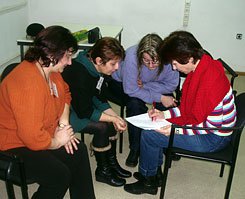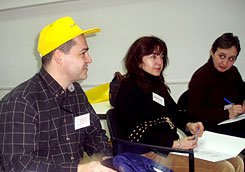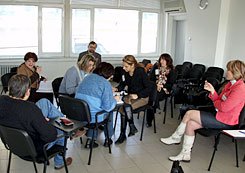Teaching Active Learning and Critical Thinking in Bulgaria’s Public Schools
A university in this formerly Communist nation endeavors to update the educational system’s Soviet-era pedagogy.

As the World Learns | Austria | Bulgaria | Canada | Chile | India | Japan | New Zealand | Pakistan | Room to Read | Russia | Sweden | Uganda | More Edutopia Resources
Public education in Bulgaria today remains largely lecture based and impersonal, a relic of the Communist system. Children ages 6-18 attend school, moving through twelve grade levels, and the average classroom accommodates thirty students, creating a rather large group that can make both learning and teaching difficult.

Instruction continues to focus on preparing good workers and obedient subjects rather than on developing twenty-first-century innovators and independent thinkers. As Bulgaria plays a more significant role in the democratic world and the global market economy, however, our schools need major educational reform. The problem: Most teachers are products of the old system -- which is still defined and funded by the government -- and thus are more or less trained to follow its traditions.

Looking to effect change, a group of professors in 1991 established the nation's first private university with the explicit goal of shifting the approach of educators. The New Bulgarian University provides an alternative, liberal, individual-centered classroom model. Today, NBU, a research-oriented institution that offers degree programs in telecommunications, computer and social sciences, the humanities, and the arts, is 10,000 students strong and, in many cases, sets standards for the state-run universities.
A Lab for Active Learning
Under the auspices of NBU, the Central and Eastern European Center for Cognitive Science conducts interdisciplinary research on the human mind and seeks to further challenge and change the education system in Bulgaria. Based on our work at the center in learning, memory, thinking, perception, and language, we established the Laboratory for Active Learning and Critical Thinking.
The lab carries out applied research in education and, thanks to a grant from the European Commission's Sixth Framework Programme, we have already established ties with various high schools. We designed a free three-day teacher-training workshop to give educators active-learning tools, showing them how to conduct action research, gather data and analyze their own teaching practices, engage students with critical-thinking exercises, and more.

A starting point was David A. Kolb's learning-style model and experiential-learning theory. Kolb, a professor of organizational behavior at Cleveland’s Case Western Reserve University, identified four learning stages: feeling, watching, thinking, and doing. Teachers need to understand that each student has his or her own learning style -- and gives preference to some of these stages over the others -- and that instruction should therefore consist of a balanced mix of teaching methods.
The traditional system in Bulgaria caters to the assimilator, or watcher, type of learner, who excels at observing and at abstract thinking, but this means that every other type of student has a hard time in class. Therefore, we're training teachers to measure and pay attention to the range of learning styles in the group and to use various techniques to meet individual students' needs.
During our workshops, to demonstrate that each person has a unique learning style, we ask the teachers to take a test. Based on this hands-on experience, they can start to appreciate students' differing styles and needs. We then provide them with methods for addressing each learning style so they may easily transfer our approach to activities in the classroom. Because the traditional educational system in Bulgaria is passive, our emphasis has been on methods that require active student participation.
Research and Results
To date, we've trained about a hundred teachers, mostly from the capital city of Sofia, where we're based. Some educators have returned for a second session, during which they share new teaching practices and video recordings of their classes.

At that point, we collectively analyze the videos, which has proven to be an effective (and fun) learning tool for the teachers, who become more enthusiastic about being innovators in the classroom and about collecting data on the end results. From our perspective, it is crucial that teachers become applied researchers in their work -- that they always gather data and reflect on the outcomes of their teaching practices -- and not just follow recipes that someone else (including us) provides.
Another sign that we are making a difference: A group of educators from a school in Sofia that focuses on math and science recently wrote a proposal for teacher training, and, after securing funding from the federal Ministry of Education and the local government, they invited our lab to provide the instruction -- the first time the teachers themselves hired us to do the training. (On previous occasions, we found a way to pay for the classes and offered them free to teachers.)
To us, this initiative means NBU and its active-learning programs no longer exist solely as an external force challenging the educational system: There is a demand for reform within the school system, and we believe it will grow.
This change must come from all of us. At NBU, we will continue to encourage teachers to take the initiative rather than to wait for the state to start reforms and provide money, while, at the same time, we hunt and fight for our own additional funding to implement our ideas.